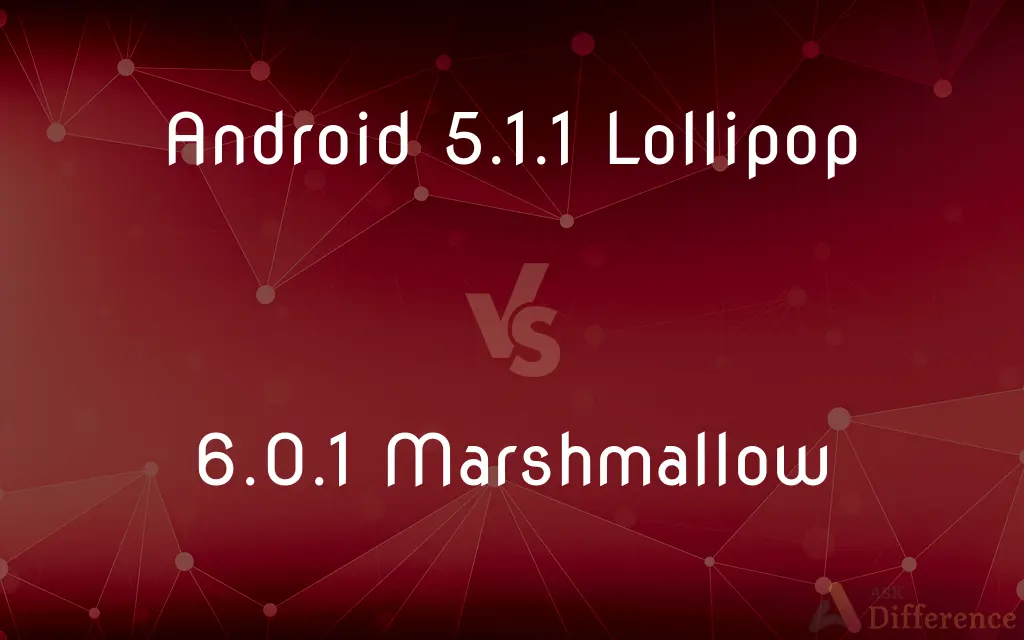Android 5.1.1 Lollipop vs. 6.0.1 Marshmallow — What's the Difference?
By Tayyaba Rehman — Published on December 3, 2023
Android 5.1.1 Lollipop is a previous OS version with Material Design; 6.0.1 Marshmallow introduced enhanced permissions and features like Doze.

Difference Between Android 5.1.1 Lollipop and 6.0.1 Marshmallow
Table of Contents
ADVERTISEMENT
Key Differences
Android 5.1.1 Lollipop was one of Google's major OS updates, introducing Material Design, a design language that brought a cohesive visual experience across devices. In contrast, 6.0.1 Marshmallow built on Lollipop's foundation, refining the user experience and bringing in a slew of new features.
When Android 5.1.1 Lollipop was launched, it made waves with its improved notification system that allowed for richer interactions. 6.0.1 Marshmallow took it a step further by introducing granular app permissions, giving users more control over what information apps could access.
Android 5.1.1 Lollipop focused heavily on enhancing the visual aesthetics and user interface, offering more fluid animations and a bolder color palette. On the other hand, 6.0.1 Marshmallow emphasized improved battery life through a feature called Doze, which reduced background processes when a device was idle.
The Smart Lock feature in Android 5.1.1 Lollipop allowed users to keep their devices unlocked in trusted environments, simplifying security. 6.0.1 Marshmallow enhanced this by introducing native fingerprint support, making device security more robust and convenient.
Both Android 5.1.1 Lollipop and 6.0.1 Marshmallow were steps forward in the Android evolution, with Lollipop setting the design groundwork and Marshmallow refining and expanding upon its features, especially in the realms of security, permissions, and battery optimization.
ADVERTISEMENT
Comparison Chart
Primary Design Language
Introduced Material Design
Refined Material Design
Notifications
Improved notification system
Granular app permissions
Battery Life Focus
General improvements
Introduced Doze for better optimization
Security Features
Introduced Smart Lock
Added native fingerprint support
User Experience
Emphasized visual enhancements
Emphasized user controls and optimizations
Compare with Definitions
Android 5.1.1 Lollipop
An OS introducing a richer notification system.
With Android 5.1.1 Lollipop, notifications became more interactive.
6.0.1 Marshmallow
Focuses on battery life with the Doze feature.
Ever since I upgraded to 6.0.1 Marshmallow, my battery lasts much longer.
Android 5.1.1 Lollipop
The version before the introduction of refined permissions.
Before the granular permissions of Marshmallow, we had Android 5.1.1 Lollipop.
6.0.1 Marshmallow
Introduced granular app permissions for users.
With 6.0.1 Marshmallow, I could decide which apps got access to my contacts.
Android 5.1.1 Lollipop
A major Android OS update featuring Material Design.
I loved the visual overhaul brought by Android 5.1.1 Lollipop.
6.0.1 Marshmallow
A successor to Android 5.1.1 Lollipop with numerous enhancements.
Switching from Android 5.1.1 Lollipop to 6.0.1 Marshmallow felt like a significant upgrade.
Android 5.1.1 Lollipop
A step forward in cohesive design across Android devices.
Android 5.1.1 Lollipop ensured a consistent look on both phones and tablets.
6.0.1 Marshmallow
An Android OS refining and expanding Lollipop's features.
6.0.1 Marshmallow built on the solid base of Lollipop, making it even better.
Android 5.1.1 Lollipop
Brought enhancements in device security with Smart Lock.
Thanks to Android 5.1.1 Lollipop, I can keep my phone unlocked at home.
6.0.1 Marshmallow
Added native support for fingerprint scanning.
6.0.1 Marshmallow made fingerprint authentication a breeze.
Common Curiosities
What design language did Android 5.1.1 Lollipop introduce?
Android 5.1.1 Lollipop introduced Material Design.
What major feature regarding battery life did 6.0.1 Marshmallow introduce?
6.0.1 Marshmallow introduced the Doze feature for better battery optimization.
Which OS would you say was more focused on user control?
6.0.1 Marshmallow, with its granular permissions, gave users more control over apps.
Which version brought granular app permissions?
6.0.1 Marshmallow introduced granular app permissions.
Did Android 5.1.1 Lollipop have native fingerprint support?
No, native fingerprint support was introduced with 6.0.1 Marshmallow.
Which version was released in 2015?
Both were released in 2015, but Android 5.1.1 Lollipop came earlier in the year.
How did Android 5.1.1 Lollipop change notifications?
Android 5.1.1 Lollipop introduced a richer and more interactive notification system.
Were there any significant UI changes from Android 5.1.1 Lollipop to 6.0.1 Marshmallow?
While 6.0.1 Marshmallow refined the Material Design introduced in Android 5.1.1 Lollipop, the core UI design remained consistent.
Were there any significant security changes from Android 5.1.1 Lollipop to 6.0.1 Marshmallow?
Yes, 6.0.1 Marshmallow introduced native fingerprint support and enhanced app permissions, improving device security.
Which version came first, Android 5.1.1 Lollipop or 6.0.1 Marshmallow?
Android 5.1.1 Lollipop came before 6.0.1 Marshmallow.
Did both versions support the "Do Not Disturb" mode?
Yes, but while Android 5.1.1 Lollipop introduced it, 6.0.1 Marshmallow refined it.
Was Google Now on Tap introduced in Android 5.1.1 Lollipop?
No, Google Now on Tap was a feature of 6.0.1 Marshmallow.
Which Android version enhanced the Smart Lock feature?
6.0.1 Marshmallow enhanced the Smart Lock feature with native fingerprint support.
Between Android 5.1.1 Lollipop and 6.0.1 Marshmallow, which had a stronger focus on visual aesthetics?
Android 5.1.1 Lollipop had a strong focus on enhancing visual aesthetics with Material Design.
If I'm looking for better battery optimization, should I go for Android 5.1.1 Lollipop or 6.0.1 Marshmallow?
You should go for 6.0.1 Marshmallow due to its Doze feature for better battery optimization.
Share Your Discovery

Previous Comparison
Mental Health vs. Emotional HealthAuthor Spotlight
Written by
Tayyaba RehmanTayyaba Rehman is a distinguished writer, currently serving as a primary contributor to askdifference.com. As a researcher in semantics and etymology, Tayyaba's passion for the complexity of languages and their distinctions has found a perfect home on the platform. Tayyaba delves into the intricacies of language, distinguishing between commonly confused words and phrases, thereby providing clarity for readers worldwide.

















































